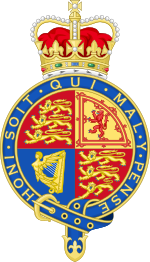Privy Counsellor on the Judicial Committee
| Judicial Committee of the Privy Council | |
|---|---|

Royal Arms as used by the Privy Council
|
|
| Established | 1833 |
| Country | Certain members of the Commonwealth of Nations |
| Location | Middlesex Guildhall, City of Westminster, London, UK |
| Coordinates | 51°30′01.3″N 0°07′41.3″W / 51.500361°N 0.128139°WCoordinates: 51°30′01.3″N 0°07′41.3″W / 51.500361°N 0.128139°W |
| Authorized by | Judicial Committee Act 1833 |
| Website | www.jcpc.uk |
The Judicial Committee of the Privy Council (JCPC) is the highest court of appeal for certain Commonwealth countries. Established in 1833 to hear appeals formerly heard by the King-in-Council, the Privy Council formerly acted as the court of last resort for the entire British Empire (other than for the United Kingdom itself), and continues to act as the highest court of appeal for several independent Commonwealth nations, the Crown Dependencies, and the British Overseas Territories.
Formally a statutory committee of Her Majesty's Most Honourable Privy Council, the Judicial Committee consists of senior judges who are Privy Councillors: they are predominantly Justices of the Supreme Court of the United Kingdom and senior judges from the Commonwealth. It is often referred to as the Privy Council, as in most cases appeals are nominally made to "Her Majesty in Council" (i.e. the British monarch as formally advised by her Privy Counsellors), who then refer the case to the Judicial Committee for "advice". The panel of judges (typically five in number) hearing a particular case is known as "the Board". The "report" of the Board is always accepted by the Queen in Council as judgment. In Commonwealth republics retaining the JCPC as their final court of appeal, appeals are made directly to the Judicial Committee itself. In the case of Brunei, appeals are made to the Sultan of Brunei, who then refers the case to the Judicial Committee for advice.
...
Wikipedia
